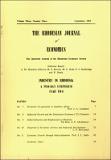| dc.contributor.author | Lombard, J.A. | |
| dc.coverage.spatial | Southern Africa. | en |
| dc.coverage.spatial | Rhodesia | en |
| dc.coverage.spatial | Zimbabwe | en |
| dc.date.accessioned | 2015-08-10T08:11:53Z | |
| dc.date.available | 2015-08-10T08:11:53Z | |
| dc.date.issued | 1969-09 | |
| dc.identifier.citation | Lombard, J.A. (1969) Economic Co-operation in Southern Africa. Rhodesia Journal of Economics, vol. 3, no.3, (pp. 7-16.) UZ (formerly University of Rhodesia), Harare (formerly Salisbury) : RES. | en |
| dc.identifier.uri | https://opendocs.ids.ac.uk/opendocs/handle/20.500.12413/6695 | |
| dc.description | A RJE conference paper on economic co-operation in Southern Africa despite the then existing political and ideological differences and hostilities within Southern African governments in the late 1960's.
Paper presented at the Symposium For Industry in Rhodesia, 11-12th June, 1969. | en |
| dc.description.abstract | The purpose of this paper is no more than to put forward some basic concepts which, to my mind, would have to underlie the economic policies of the various states on the sub-continent of Southern Africa if we all wish to obtain the greatest possible economic benefit from our respective resources without having to sacrifice our respective socio-political ideals as independent national communities.
South of the sixth parallel, i.e. including Angola, Zambia, Malawi and Mocambique, one finds a total population of close to 50 million people, producing an output of perhaps £5,000 million. I mention these aggregates merely to establish a very rough impression of the demographic and economic orders of magnitude involved. The figures have very little further significance and could in fact lead to serious misconceptions. Thus the conclusion that the income per head of the population in the sub-continent amounts to £100 is obviously meaningless, because the income base and the population base of this ratio is functionally very tenuously related to each other. The incomes actually received by the set of people living, say around Lake Bangweulu, in Zambia, are at present not even remotely influenced by the productive capacity of the community living say in Paarl, South Africa. | en |
| dc.language.iso | en | en |
| dc.publisher | Rhodesian Economic Society (RES). University of Rhodesia (now University of Zimbabwe.) | en |
| dc.rights.uri | http://creativecommons.org/licenses/by-nc-nd/3.0/ | en |
| dc.subject | Development Policy | en |
| dc.subject | Economic Development | en |
| dc.subject | Trade | en |
| dc.title | Economic Co-operation in Southern Africa | en |
| dc.type | Conference paper | en |
| dc.rights.holder | University of Zimbabwe (UZ) (formerly University College of Rhodesia) | en |


